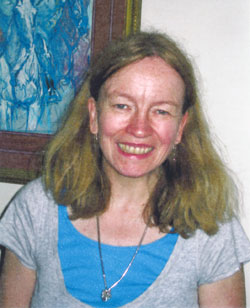 International historian; former fellow at German Historical Institute
International historian; former fellow at German Historical Institute
Elisabeth "Lisa" Glaser, a 20th-century international historian, died on September 23, 2010, after a prolonged struggle with amyotrophic lateral sclerosis (also referred to as ALS or Lou Gehrig's disease).
Born on June 28, 1954, in Cologne, Germany, she studied at the University of Cologne, where she received the MA in 1980 and PhD in 1984. During the next six years she served as an assistant professor in the university's Anglo-American Seminar, which, under the leadership of Erich Angermann, was the most important center of American studies in the Federal Republic. Angermann upheld the liberal tradition of his own teacher, Franz Schnabel, and Glaser came to share Angermann's admiration for American political institutions. Given the small size of the department, she taught a wide palette of courses, not merely on her specialty, U.S. foreign relations, but also on economic affairs, African American studies, immigration, and constitutional history. She received research grants from the Deutsche Forschungsgemeinschaft (DFG)and the German Marshall Fund.
In 1986 Glaser published her first book, Die Philippinen den Filipinos! an exhaustive study of the heated national debate over the islands' status from their conquest in 1898 through 1906. When no consensus was reached on tariff or economic policy or on the purpose of holding the islands, the deadlock obstructed administrative reform in the Philippines.
Between 1991 and 1996, Elisabeth Glaser served as a senior fellow of the German Historical Institute (GHI) in Washington, D.C., where she organized numerous conferences, acted as the institute's liaison to the Conference Group on Central European History and the American Institute for Contemporary German Studies, and led the annual summer tour of German archives. She was also a visiting lecturer at Georgetown University.
During this period Elisabeth Glaser edited four books. The first, Hannah Arendt and Leo Strauss: German Emigrés and American Political Thought after World War II (1995), deepened her interest in the Central European emigration of the 1930s. In Transatlantic Images and Perceptions: Germany and America since 1776 (1997), she treated the impact of individual and mass psychology on international relations. She took greatest pride in The Treaty of Versailles: A Reassessment after Seventy-Five Years (1998), in which she assembled the leading experts on the peace settlement after World War I and produced a major retrospective analysis. In Bridging the Atlantic: The Question of American Exceptionalism in Perspective (2000), which was dedicated to the memory of Erich Angermann, she brought together another distinguished group of authors to examine and compare national stereotypes on both sides of the ocean.
Elisabeth Glaser also published more than 20 rigorously researched articles on an astonishing variety of subjects. These included monetary reform in East Asia and Chile, economic war aims during World War I, postwar world trade, German-American relations, business firms such as the Guggenheims and J.P. Morgan & Co., and the Central European emigration. She remained to the end a perspicacious reviewer of books on American subjects for the leading German historical journals.
During her GHI years, Glaser's interests underwent a sea change. She began to read deeply on psychoanalysis and on the Holocaust. Although her work on the Central European emigration had impressed upon her the difficulties of achieving professional success in a new country, she resolved to remain in the United States. When she could not find a suitable teaching post, she embarked upon a second career as a psychoanalyst. She qualified as a licensed professional counselor, graduated from the psychotherapy program of the Washington Psychoanalytic Foundation, and completed all but the last case supervision to become a psychoanalyst through the New York Freudian Society. She maintained a psychotherapy practice in Charlottesville and Richmond.
In addition to her numerous accomplishments, Glaser remained a gentle, modest, and generous person, always prepared to let others take credit for her contributions. She continued her historical research and juggled two careers with aplomb, co-taught graduate courses at the University of Virginia with her husband, Stephen Schuker, and lavished unconditional love on her stepchildren, Lauren and Daniel.
Elisabeth Glaser bore her untimely affliction with ALS with stoicism and never lost her magnetic smile. In her final article on the emigration trauma of the self-psychologist Heinz Kohut, she quoted Freud's apothegm following his painful exile from Vienna: "When deceived, the fool complains; the upright man departs in silence."
—Carole Fink
Ohio State University
Tags: In Memoriam
Comment
Please read our commenting and letters policy before submitting.






